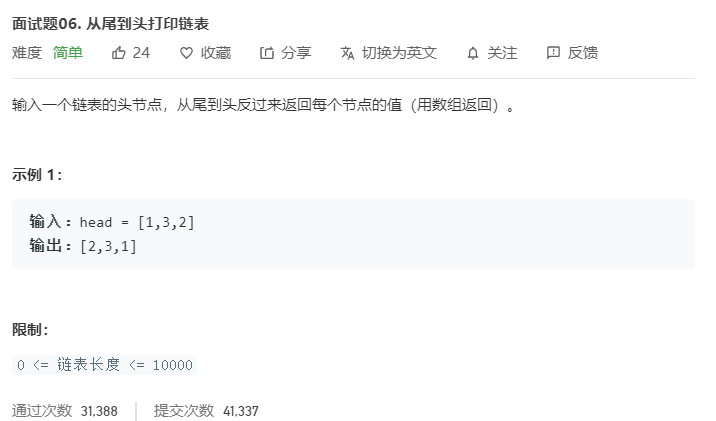[Lc]面试题06从尾到头打印链表
Contents
题目

题解
//Definition for singly-linked list.
struct ListNode {
int val;
ListNode *next;
ListNode(int x) : val(x), next(NULL) {}
};
1. 栈
从头到尾遍历链表,先取数入栈,再从栈中弹出放入数组
- 时间复杂度$O(n)$,遍历一次数组一次栈
- 空间复杂度$O(n)$,栈和res
class Solution {//两个方法。1. 栈
public:
vector<int> reversePrint(ListNode* head) {
vector<int> res;
if(head == nullptr) return res;
stack<int> s;
ListNode* cur = head;
while(cur){
s.push(cur->val);
cur = cur->next;
}//所有元素入栈
while(!s.empty()){
res.push_back(s.top());
s.pop();
}//栈中元素取出
return res;
}
};
2. 递归
递归就是用栈实现的,因此本题也能用递归
- 时间复杂度$O(n)$
- 空间复杂度$O(n)$,递归用栈
class Solution {//两个方法。1. 栈
vector<int> res;
public:
vector<int> reversePrint(ListNode* head) {
if(head){//head存在,继续递归,否则输出
if(head->next){
reversePrint(head->next);
}//head->next存在,递归下一个节点
res.push_back(head->val);//没有下一个节点,本节点放入res
}
return res;
}
};
当链表非常长的时候, 就会导致函数调用的层级很深,从而有可能导致函数调用栈溢出。显然用栈基于循环实现的代码的鲁棒性要好一些。
——《剑指offer》
Author ChrisHRZ
LastMod 2020-05-10